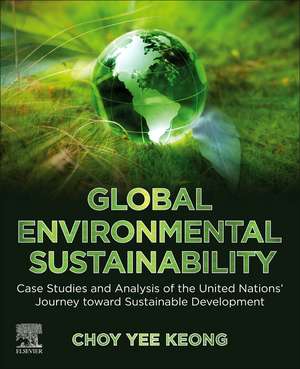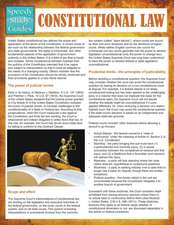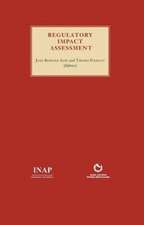Global Environmental Sustainability: Case Studies and Analysis of the United Nations’ Journey toward Sustainable Development
Autor Choy Yee Keongen Limba Engleză Paperback – 6 noi 2020
By utilizing in-depth analysis, both quantitative and qualitative, and challenging the status quo of what is expected in the global approach to sustainable development, Global Environmental Sustainability provides the theory and methodology of empirical sustainable development which is especially germane to our advanced society today, which is deeply entrenched in a crisis of environmental morality. More particularly, it serves as a salient source of moral reconstitution of society grounded in empirical reality to liberate man’s excessive spirit of individualism and self-aggrandizement to the detriment of the environment. Epistemologically, the book furnishes a remarkable tour de force with a new level of analytical insight to help researchers, practitioners, and policymakers in sustainability and environmental science, as well as the many other disciplines involved in sustainable development, to better understand sustainability from a new perspective and provides a methodological direction to pursue solutions going forward.
- Provides a systematic exposition of sustainable development in all its complexity, with all the chapters complementing each other in an integral way
- Presents extensive empirical evidence of various environmental problems across the world including China, the United States, Canada, Southeast Asia, South America and Africa, and the extent to which the United Nations has succeeded in driving toward global environmental sustainability
- Provides a cogent examination of the treatment of our global commons by some of the world’s most powerful leaders
- Includes data from field studies and in-depth interviews with indigenous people in Borneo’s rainforests of the Malaysian state of Sarawak most affected by environmental change
Preț: 647.83 lei
Preț vechi: 828.66 lei
-22% Nou
Puncte Express: 972
Preț estimativ în valută:
123.98€ • 129.27$ • 103.04£
123.98€ • 129.27$ • 103.04£
Carte tipărită la comandă
Livrare economică 14-28 martie
Preluare comenzi: 021 569.72.76
Specificații
ISBN-13: 9780128224199
ISBN-10: 0128224193
Pagini: 464
Dimensiuni: 191 x 235 x 29 mm
Greutate: 0.79 kg
Editura: ELSEVIER SCIENCE
ISBN-10: 0128224193
Pagini: 464
Dimensiuni: 191 x 235 x 29 mm
Greutate: 0.79 kg
Editura: ELSEVIER SCIENCE
Public țintă
Researchers and practitioners in environmental science, management and policy as well as sustainabilityCuprins
1. Introduction: Sustainable development-a preliminary reflection2. The United Nations’ journey to global environmental sustainability since Stockholm: An assessment3. The United Nations’ journey to global environmental sustainability since Stockholm: The paradox4. Greening for a sustainable future: The ethical connection5. The nexus of environmental ethics and environmental sustainability: An empirical assessment6. The United Nations environmental education initiatives: The green education failure and the way forward7. Summary and conclusion







